As the tournament reached its halfway point, Ian Nepomniachtchi and Fabiano Caruana are again(!) the only two players to score victories, significantly distancing themselves from the rest of the field
With half of the tournament in Madrid played, Ian Nepomniachtchi is alone in the lead with 5.5/7. The former challenger for the world chess crown is on the path of repeating his 2020/21 victory in the Candidates, where he secured a leadership position early on and kept it until the end of the tournament. Right behind him, by half a step, is another former winner of the Candidates and challenger, Fabiano Caruana, who has five points. The two have now distinguished themselves from the rest of the field.
Behind them, on fifty percent, is Hikaru Nakamura. The lower part of the board is made up of three players on three points: Jan-Krzysztof Duda, Ding Liren and Richard Rapport. At the bottom of the table are the oldest and the youngest players in this year’s Candidates: Teimour Radjabov and Alireza Firouzja, who both have 2.5 points.

The halfway point of the 2022 Candidates saw Ian Nepomniachtchi score a confident victory against Richard Rapport. In the Petrov, Rapport walked directly into Nepomniachtchi’s preparation – a forced, sharp line leading to a quick draw. It seemed that Rapport had no choice but to accept a quick draw following a repetition of moves, but – to the surprise of many – he decided to play on, despite the odds stacked against him. What occurred was a battle where Rapport had two rooks for a queen, but his king was exposed. In a sharp and wild position, White wasn’t without chances, but, despite Rapport’s heroic efforts, Nepomniachtchi made sure nothing came of them.
Despite the loss, Rapport deserves praise. Many chess pundits who were following the game said that Rapport’s decision to decline an early draw and enter a weaker and riskier position instead was unnecessary and that he should have accepted reality. That may be objectively true, however, it is exactly those who refuse to accept (a dim) reality that stands a chance to make a difference and sometimes manage to do it. Rapport has shown that he is here to fight whatever the odds and throw a good show for the audience, the people who love chess. From a wider perspective, chess was granted another interesting story to tell, which goes beyond the standard reciting of lines and is much more about psychology, courage and character. A rare exception to dull and quick theoretical draws, which – however realistic – make the game less attractive for everyone.

The second victor of the day was Fabiano Caruana, who defeated Teimour Radjabov. The game got off to a better start for Radjabov, who seemed to have surprised Caruana with a rarer variation of the Sicilian, playing 2…a6 and then following the line with e5 and d5. Caruana seemed somewhat uncomfortable as Radjabov was blitzing his moves. However, when the dust settled, it turned out that Caruana was a pawn up with more initiative. He calmly proceeded to grind Black’s position, entering a sharp but winning rook endgame. Radjabov – an expert in finding a way to a draw – was trying every trick on the board. Both sides promoted queens in the endgame, but it was of no help for Black. Once the second pair of queens was exchanged, it finally became apparent to Radjabov that Caruana would be quicker in promoting his third queen. After nearly seven hours of play, Radjabov accepted defeat.
The other two games in the seventh round were calmer.
Jan-Krzysztof Duda and Hikaru Nakamura split a point in the Nimzo-Indian. Despite having somewhat more initiative, the game was mostly balanced throughout. All White’s attempts to get things going were skillfully thwarted by Black. Next to Nepomniachtchi and Caruana – Nakamura is the only other player in the Candidates who has so far had a victory. However, since his comeback in round two following a loss on day one, the world’s top chess streamer is struggling to make a break past fifty percent. It remains to be seen which way he will go in the second part of the tournament. As for Duda – he has been very constant in his level of play in the first seven rounds. If he keeps it up, results will surely follow.
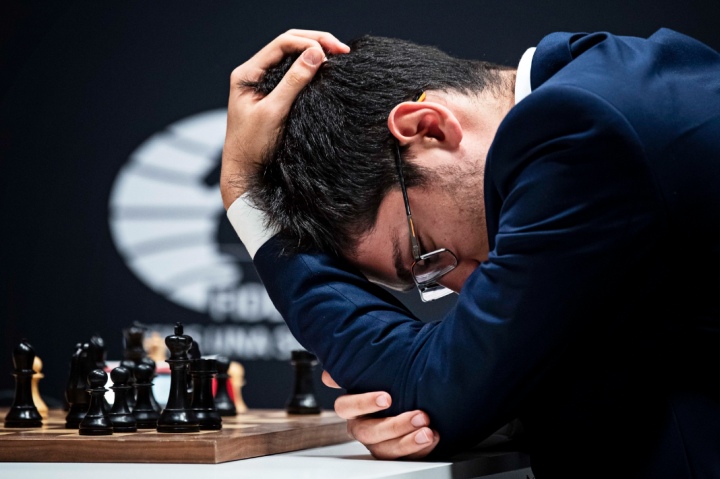
Both Ding Liren and Alireza Firouzja were players for whom many had great expectations before the start of the tournament. But so far, both have seriously struggled and, at the bottom of the board, are desperate for a breakthrough. However, neither managed to make to step forward today. In the English opening, Firouzja achieved a dynamic position, favouring his style of play. Ding, leading white pieces, played very solidly – both creating chances and countering Firouzja’s attempts to break free. Like in the previous games, the Frenchman spent much more time thinking, trying to find the magic spark to let his creativity run free, but without success. With 2.5/7, Firouzja is at the bottom of the table where he is now joined by Teimour Radjabov, whom he will be facing in the eighth round, while Ding Liren has three points.
Here follows a closer look at the games from round seven of the Candidates.
Richard Rapport vs Ian Nepomniachtchi: The victor and the hero
It is said that fortune favours the brave, but in today’s game between Rapport and Nepomniachtchi, that wasn’t the case. In their previous encounters, they drew eight times with one victory for Rapport. Following six hard-fought draws, this could have been a game where Rapport could have thrown the Candidates tournament wide open.
As in his Round 5 game Nepomniachtchi responded with a Petrov. An extremely sharp but forced line was played where Rapport walked straight into Nepomniachtchi’s preparation.
White ended a rook up on the move 14, but Black had serious mating threats.
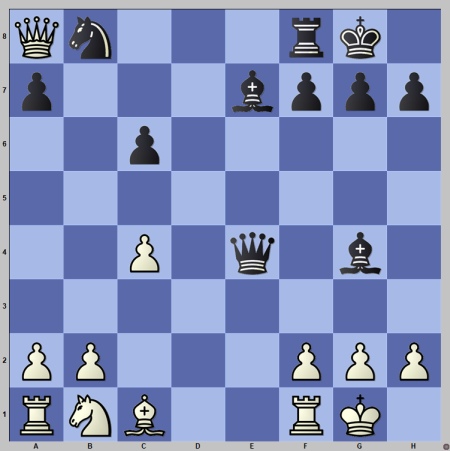
After 14…Bh3 15.gxh3 Qg6+ 16.Kh1 Qe4+ 17. Kg1 Qg6+ 18.Kh1 Qe4+ Rapport spent a lot of time thinking – to go for a draw by perpetual or look for a way out. But opting for 19.f3 instead of 19.Kg1, meant entering a very complicated position where – according to the computer – White is weaker, despite being a rook up!
Hand in the head, Rapport was spending a lot of time thinking. His mood was noticeable from his facial expressions – from being very unhappy, almost angry with the position, to shuffling in his chair, looking around the hall, to staring at the board. After almost half an hour of thinking, he opted for 19.f3. A big surprise. Rapport showed he meant to fight. In the meantime, Nepomniachtchi was pacing up and down the hall.
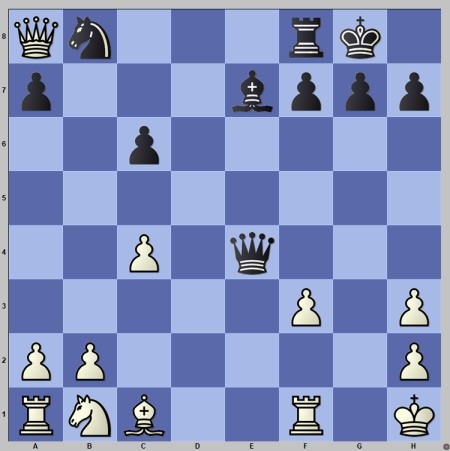
After 19…Qd3 20.Kg2 Qg6+ 21. Kh1 Qd3 Rapport turned down a draw again and entered directly a position in which he was – according to the computer – significantly worse. By move 24. White exchanged his queen for two rooks, and we had the following position on the board:
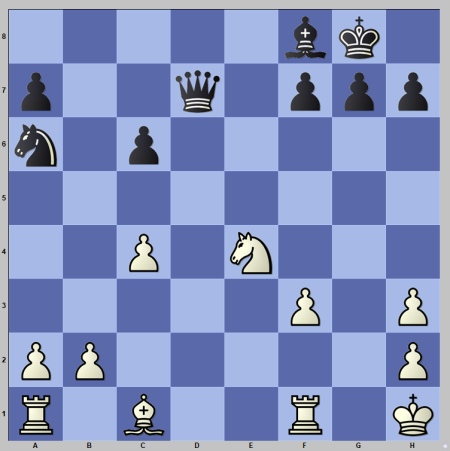
Despite the material equilibrium, White had a ruined pawn structure on the kingside with his king dangerously exposed. To make things even worse, Rapport did not make the most precise moves.
Nepomniachtchi, on the other hand, was playing fast – he brought in his knight from the edge of the left flank back into action on the kingside, advanced his h-pawn and started coordinating an attack. Rapport responded by advancing his queenside pawns and threatening Black’s hanging a- and c- pawns.
Black executed his attack swiftly and sharply. Following the exchange of knights, he asserted complete dominance over the board.
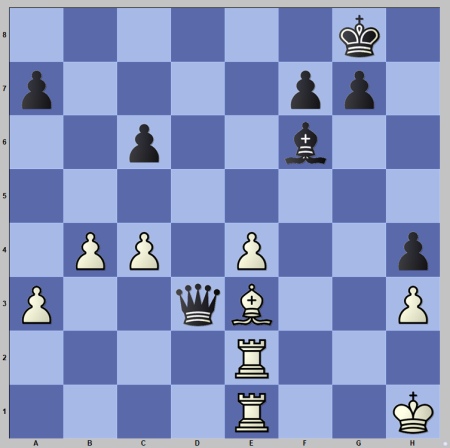
White was completely paralyzed. With 40.Bxa7, he gave up the last remaining pawn protecting his monarch, and Black started weaving a mating net around the opponent’s king while advancing his h-pawn towards promotion.
After three hours of play, Rapport resigned. This game was the first to finish. The victory left Nepomniachtchi as the sole leader with 5.5/7.

Rapport paid the price of not being well versed in opening preparation. Nepomniachtchi managed to impose a sharp but forced draw as Black. A wasted opportunity for Rapport and a convincing victory by Nepomniachtchi. Rapport, who could have had seven draws and be in the middle, is now in the lower part of the table, with three points. As for Nepomniachtchi, he achieved a big victory, almost entirely thanks to his home preparation and not having to come up with much on the board.
Jan-Krzysztof Duda vs Hikaru Nakamura: The (im)perfect rebound
It was a dangerous game for Duda: he was up against one of the most experienced and strongest world players. Following a loss to Nepomniachtchi, Duda might have been tempted to pressure as white, but he had to be careful not to over-force it.

In the Nimzo-Indian, White entered a variation with an isolated pawn on d4. It seems that Duda was more prepared for the opening line than Nakamura, who spent some time thinking about the moves in the first part of the game.
After trading a couple of minor pieces on d5 and getting rid of his isolated pawn, White got a slight edge and potentially a very promising with a ‘good’ knight against a ‘bad’ bishop. At this point, many thought that Nakamura was heading for a positional uphill battle.
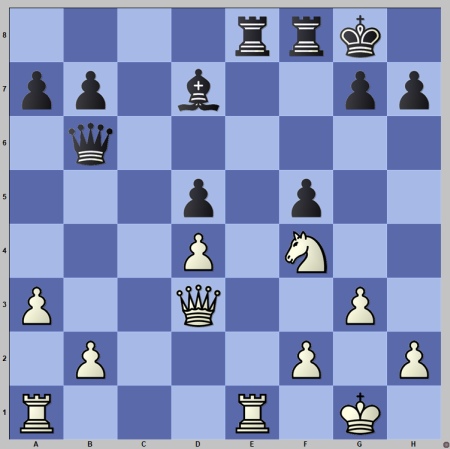
However, after a precise 19…Re4! by Nakamura, it just did not work out for White in concrete tempo for tempo variations. White’s position still looked very attractive but offered hardly anything more as Black had everything covered.
The game eventually liquidated into an even rook endgame where the two players agreed on a draw.
Ding Liren vs Alireza Firouzja: The struggle continues
It was a duel between the two players whose struggle is most obvious in this tournament.
Ding’s mojo is almost there; he has been very close to winning against Rapport or Radjabov in the previous rounds. Firouzja, on the other hand, is struggling to find a way to impose positions he likes, which has affected his result.
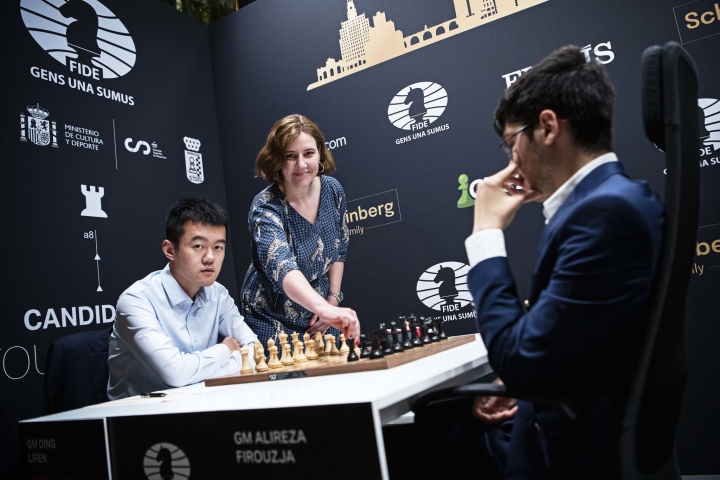
The English opening was played. Both players secured their kings early on, and then the play concentrated more on the queenside, where Firouzja was pushing his a-pawn from early on. A dynamic and unbalanced position was developing – which is supposed to favour Firouzja’s style of play.
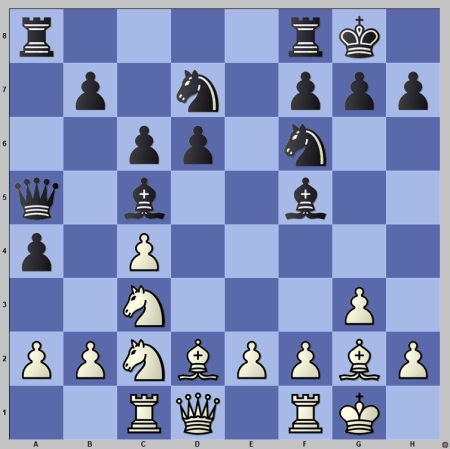
In this position, Firouzja spent 48 minutes thinking about his next move and decided to go 13…Qa7. Chess engines prefered 13…Rfe8, but it was still a good position for Black. However – as in previous games – Firouzja was entering time trouble.
Ding played very solidly, and following the exchanges in the centre, the opponents ended up in an equal position in which neither had a feasible plan of pressing for a win. Firouzja managed to create a runner on the b-file in a rook and knight endgame, but Ding was active enough to counter any chances for Black to get his king to the centre of the action.
Black pressed on, playing on both sides of the board, but white managed to counter every attempt for a breakthrough, and both had to come to terms with a draw.
Fabiano Caruana vs Teimour Radjabov: Smoke and mirrors
Caruana and Radjabov are on opposite trajectories in Madrid: While the first is a step behind the leader, Radjabov is half a step away from the bottom. Before the game, Caruana (who is coached by Vladimir Chuchelov, who once coached Radjabov) had a 4:0 record against his opponent.

However, the game started with a surprise as Radjabov stunned Caruana in the opening. In the Sicilian, Teimour played a somewhat surprising move 2…a6, hoping to unsettle Caruana. It was now Caruana who had his own surprise – spending nine minutes thinking on the move three! He played 3.c4, to which Radjabov responded with 3…Nc6, which was followed by 4.d4 cxd4 5.Nd4 e5. At this moment, again, Caruana spent a lot of time (16 minutes) thinking before he moved the knight to f5. In contrast to Caruana, Radjabov was blitzing the moves, including 6…d5, temporarily giving up a pawn, which he played in 24 seconds.
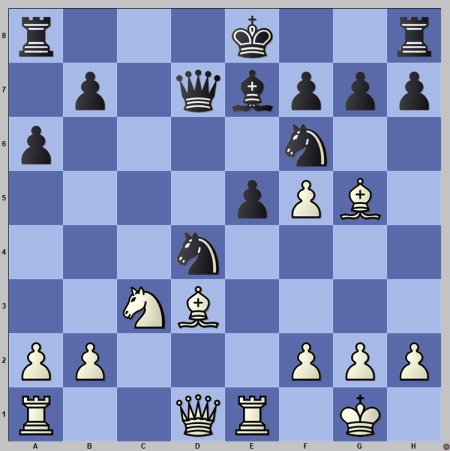
Radjabov’s opening strategy did not work out that well as White got some edge. To make things worse, at this point, Radjabov started to err. Giving up his pawn with 13…0-0-0 was part of his plan, but his decision to castle long instead of short meant that he was in trouble. His queenside fortress was weak, exposed to white bishops and in the very next move – 14.Rxe5 – Caruana had his rook join the front lines.
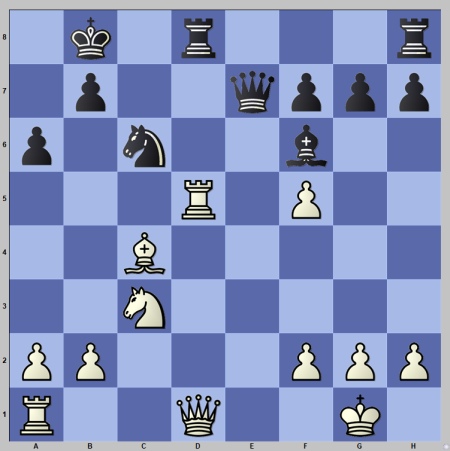
By move 18, the evaluation of the position was clear: Caruana was a pawn up, with more active pieces, having more space under his control. However, here he played slightly imprecisely, putting his queen on d3 instead of the more threatening 18.Qb3. This enabled Radjabov to put his queen on b4 and get some chances for resistance.
As the game progressed, Caruana showed he had a clearer plan – he repositioned his bishop to aim at the Black’s queenside, coordinated his rooks and then activated his king. However, when implementing this plan Fabiano committed an inaccuracy and gave Black a chance to get off the hook.
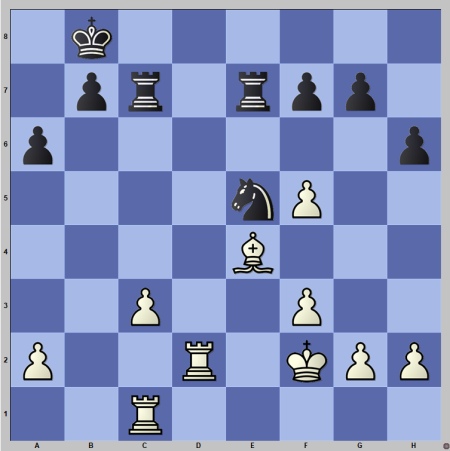
Here Black could have transferred his knight to f6 by 29…Ng4! followed by 30…Nf6, cementing his position with good drawing prospects. Radjabov however played 29…f6? weakening the g6-square and allowing White’s king to penetrate Black’s camp later on.
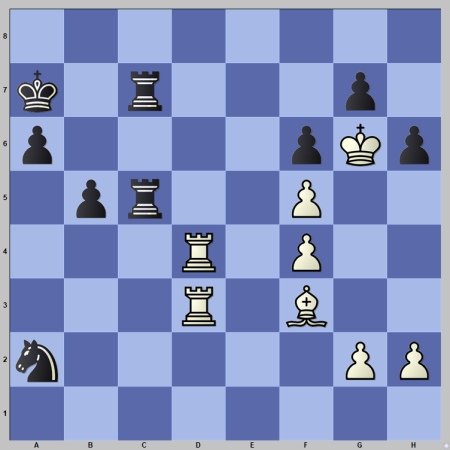
Black eventually cleared White’s queenside pawns, but it did not help as White was simply faster on the kingside. Ironically the opponents promoted the queens simultaneously, and Black delivered a check first, but Caruana pieces dominated the board, and after the queens were traded, the last ray of hope went out for Black. A few moves down the road, Teimour threw in the towel.
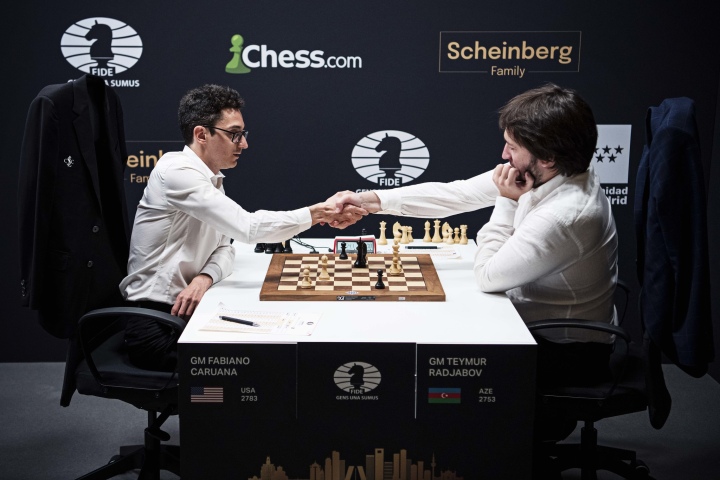
Round eighth of the Candidates starts on Sunday the 26th of June at 3 PM CEST at the Palacio de Santona in Madrid.
The pairings of round eighth are as follows:
Richard Rapport vs Jan-Krzysztof Duda
Ian Nepomniachtchi vs Ding Liren
Hikaru Nakamura vs Fabiano Caruana
Alireza Firouzja vs Teimour Radjabov
For more information please visit: https://candidates.fide.com/
Text: Milan Dinic
Photos: FIDE / Stev Bonhage
2022 Candidates Tournament Partners:

